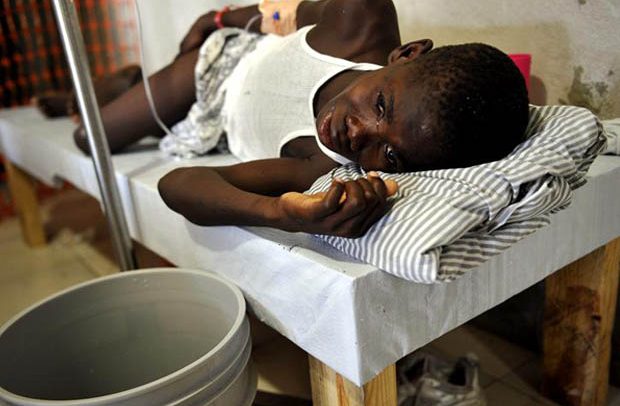Flashback: A patient suffering from cholera
An Alert over the possible outbreak of cholera has been issued by the Ghana Health Service (GHS).
A correspondence from the GHS, signed by the Director-General, Dr Anthony Nsiah-Asare, disclosed that with the onset of the rainy season and other prevailing conditions in the country, the possibility of a cholera outbreak is high.
“As the rains have started to set in at certain locations of the country and will be getting to the peak season very soon, with the other existing prevailing risk factors, the risk for cholera outbreak is very high,” the statement said.
The GHS, therefore, cautioned the public against poor personal hygiene and urged them to adopt preventive measures to avoid contracting the disease.
“Cholera is a preventable disease provided that safe water is made available and proper sanitation practices are adhered to… Signs and symptoms of cholera are frequent diarrhoea with or without vomiting. Cholera spreads when faeces and/or vomitus of an infected person contaminates the water or food of another person and it is swallowed,” it added.
It advised persons who show signs and symptoms of cholera to report immediately to the nearest health facility for free treatment.
While emphasizing that cholera is preventable, the GHS pointed out that the disease can be prevented “by improved environmental sanitation, personal hygiene and drinking safe water and frequent handwashing with soap under running water.”
Ghana experienced its highest cholera outbreak in 2014 when the GHS recorded a total of 28,975 cholera cases with 243 deaths from 130 out of the 216 districts in all 10 regions of Ghana.
The figure reduced to 618 reported cases countrywide with five deaths in 2015.
In 2016, more than 150 cholera cases were again recorded in the Central Region with no known death recorded.
Ebola Alert
The GHS also announced the confirmed cases of Ebola virus disease (EVD) in the Democratic Republic of Congo.
According to the World Health Organisation, as May 8, two out of the five samples collected from suspected patients tested positive for EVD.
“In the light of this development, the Ministry of Health/Ghana Health Service have sent alerts on the outbreak to all regional directors of Health Service, chief executives of teaching hospitals and all other relevant agencies and institutions,” the statement continued.
The release further maintained that surveillance on EVD and other acute viral haemorrahagic fevers in general has been heightened nationwide, mechanisms to updated preparedness and response plans at all levels for EVD have been initiated, as well as sensitisation of health staff and creating necessary public awareness.
The service, thus, advised the public to adhere to preventive measures including reporting symptoms of fever, fatigue muscle pain, headache, and sore throat to the nearest health facility and avoiding direct contact with persons affected and burial of Ebola-related deaths by trained personnel.
The most widespread outbreak of Ebola virus disease in history occurred in 2013-2016 in three West African countries— Liberia, Guinea and Sierra Leone— and led to the lost of over ten thousands and rendered several displaced.
In June 2017, the World Health Organisation (WHO) declared the end of the Ebola virus epidemic in Africa until the recent resurfacing in the DRC.
By Jamila Akweley Okertchiri


